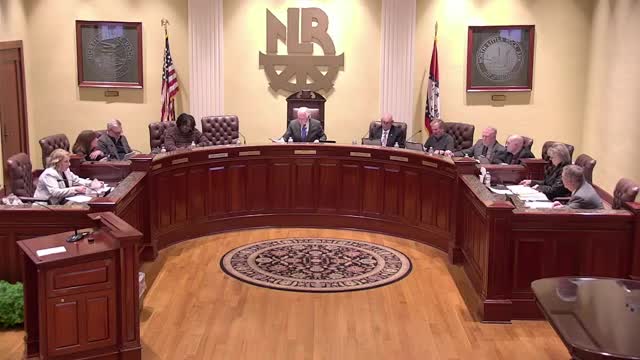Council reviews conditional-use request for auto repair at 3820 Lookout Road; council limits hours and excludes flat-tire service
Get AI-powered insights, summaries, and transcripts
Subscribe
Summary
The North Little Rock City Council held a public hearing on a conditional-use permit for an auto repair business proposed at 3820 Lookout Road and adopted amendments limiting hours and excluding flat-tire repairs.
The North Little Rock City Council held a public hearing on a conditional-use permit for an auto repair business proposed at 3820 Lookout Road and adopted amendments limiting hours and excluding flat-tire repairs.
The proposal came from a business owner seeking to relocate his shop a few hundred feet from its current site on JFK Street; supporters said the move was a relocation, not an expansion. Opponents, including leaders from a nearby Episcopal church and residents who live behind the lot, raised concerns about noise, hydraulic equipment, and stormwater runoff.
Tristan Blankenship, representing the applicant, told the council, “this is not an expansion.” Blankenship said the owner has operated in North Little Rock for more than two decades and that the proposed building is a relocation a few hundred feet from the existing site.
Church representative Mr. House said the congregation and its leadership opposed the permit, arguing the new location could bring “tires… major auto repairs, and the use of hydraulic and, air equipment” close to church activities and nearby backyards. He highlighted weekly church programming — counseling, meetings and concerts — that he said could be affected by noise.
The applicant, identified in the hearing as Nick Kokaya, described the proposed services as “normal regular tune up” work and brake and transmission service for higher-end European cars. Speaking through an interpreter at the podium, Kokaya said he would not perform heavy body work or tire shop operations at the new site and that he “[does] not use any machine, any noise.”
Planning staff explained why the application required a conditional use. Planning staff member Sean told the council that conditional uses were added when the city revised its zoning ordinance around 2005 so the city could control activities such as outside car work, runoff and similar impacts. He also noted that state environmental permits (ADEQ) could apply to vehicle-related waste and runoff.
Council members and residents questioned several technical points. Doug (identified in the public record) said engineering drawings filed with the planning commission show a stormwater settling basin on the proposed site; he warned the basin could become a mosquito pond for neighbors behind the property. Council member Ross pointed to the proximity of a cul-de-sac and nearby backyards, saying runoff “is gonna be in their children's playground, in the backyard.”
To address neighborhood concerns, the council adopted two amendments during the meeting. Council member Ross moved — and the council approved — an amended operating-hours condition that restricts the business to 8 a.m. to 6 p.m., Monday through Saturday. Council member Ross later moved, and the council approved, an amendment explicitly excluding “flat tire repairs” from the conditional use permit.
Council discussion noted that the applicant’s current hours at his existing location are shorter (the applicant said his current hours are roughly 8:30 a.m. to 5 p.m. weekdays, with limited weekend activity) and that the applicant maintained he would not use pneumatic/hydraulic tools or perform heavy tire work.
The record includes petitions: Blankenship said the applicant presented “20-something signatures” from supporters; council members and others noted that many names on that petition were businesses located away from the immediately affected cul-de-sac and that few residents from the nearest street signed in favor.
The hearing closed after questions for the applicant and planning staff. The council voted on the ordinance as amended during the same meeting; the meeting transcript records the motions and roll-call discussion and confirms the two amendments passed. The transcript does not contain a clear, unambiguous final tally in the audible record provided here; the official printed minutes should be consulted for the certified vote count.
The council and staff noted permitting and construction requirements that would still apply if the council approves the conditional use, including engineering review of any fill or retaining walls and ADEQ requirements for handling vehicle waste. The church representative and several residents said that, if the permit were denied, the applicant could not reapply for one year under city rules.
The council’s action on the conditional use was linked in the hearing to these practical controls — the placed time limits and the exclusion of flat-tire repairs were explicit conditions added by the council. The planning record and any required engineering or environmental permits remain prerequisite steps for building or operating the proposed shop.
